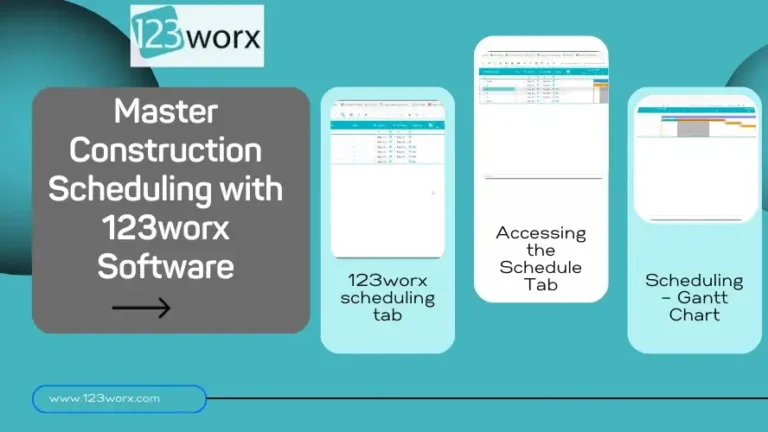Selecting the top construction scheduling software in 2025 can make the difference between projects that help manage your construction work to avoid costly delays and budget overruns. The best construction scheduling software available in the market for construction managers and project schedulers.
That’s why here we are making a comparison of the Top 10 Construction Scheduling Software for 2025, their features, pricing, and use cases can help you and your team make an informed decision. Whether you are looking for the best Construction Scheduling Software for a small contracting business or software for scheduling the largest construction projects, we have you covered.
Over 60% of contractors now rely on scheduling software to avoid cost overruns. This 2025 guide compares the best 10 construction scheduling software tools for builders and contractors. Learn which platforms, like 123worx, Buildertrend, and Procore that offer the best mix of scheduling, collaboration, and cost control features.
Why Every Contractor Needs Construction Scheduling Software in 2025
Construction activities involve scores of moving components. Unless you have a robust scheduling solution, contractors generally experience:
- Missed deadlines and project extensions
- Communication gaps between the office and fieldworkers
- Resource conflicts and labor inefficiencies
- Manual updates and transparency issues
The right construction scheduling software:
- Makes real-time tracking possible
- Automates notifications and dependencies
- Promotes team collaboration
- Modern real-time scheduling tools help contractors keep teams aligned across offices and job sites.
- Improved forecasting and budgeting
Contractors today can’t rely solely on spreadsheets. Using modern construction scheduling tools like 123worx
to manage teams, timelines, budgets, and field updates in real time. By replacing spreadsheets and whiteboards with cloud-based platforms, contractors gain control, transparency, and profitability.
The following is a concise list of the most popular contractor construction scheduling software in 2025: 123worx, Buildertrend, Procore, Fieldwire, Smartsheet, Contractor Foreman, and CoConstruct. They simplify project planning, streamline team workflows, and reduce delays, which is why they are a necessity for today’s busy contractors dealing with complex construction schedules.
Best Construction Scheduling Software for Builders and Contractors (2025 Edition)
- 123worx – Best for SMB Contractors
- BuilderTrend – Residential Builders
- Procore – Large Firms
- Fieldwire – Field Teams
- Smartsheet – Flexible Workflows
- Contractor Foreman – Cost-Effective All-in-One
- CoConstruct – Custom Homebuilders
- Monday.com – Flexible Scheduling for Any Team
- Autodesk Construction Cloud – Enterprise & Design Integration
- Microsoft Project – Traditional Scheduling Power
Let’s discuss each of these interfaces in detail.
1. 123worx – Top Construction Scheduling Software
Designed with small to mid-sized contractors in mind, 123worx is an end-to-end, cloud-based construction software platform that offers powerful scheduling tools. Built on the construction vertical-specific experience gained by its founders, 123worx differentiates itself through its understanding of the SMB construction market.
123worx delivers more than scheduling by integrating necessary features such as financial modules, CRM systems, and compliance management into one integrated software platform. It also connects seamlessly with the best estimating software for builders for end-to-end accuracy. Mobile-ready, intuitive design, and live collaboration features keep your construction teams connected, no matter where you are in the project lifecycle. The 123worx platform enhances its website through ongoing feedback from contractors, which ensures its functionality delivers sustained value and a positive return on investment.
Key Features:
- Scheduling in Gantt charts using drag-and-drop changes
- Task dependencies and notifications
- Mobile-friendly portable access
- Real-time co-working software
Pros:
- Cost-plus pricing technique
- 95% paper reduction
- 50% quicker task accomplishment
Cons:
- Currently optimized mostly for SMBs
User Rating: 4.8/5
Best for Builders, remodelers, and specialty contractors.
2. Buildertrend – Good For Residential Construction Scheduling
Popular in residential contracting, Buildertrend integrates project scheduling and communication tools for clients. The web-based system is centrally oriented toward contractor-client collaboration, streamlining the management of expectations, as well as keeping everyone informed on a timely basis.
The service also includes lead management and service tracking features that can provide a competitive advantage when it comes to after-sales services and customer satisfaction. It has an intuitive UI and tutorial guides that make it easy to onboard, even for teams who aren’t used to working with software.
Key Features:
- Daily records and schedule templates
- Owner portal
- Resource allocation
Pros:
- Ideal for client interactions
- Including budgeting and proposals
Cons:
- Prices are higher for larger teams
User Rating: 4.6/5
Best For: Renovation builders and home builders.
3. Procore – For Larger Firms
Procore Scheduling Tool is an enterprise software platform that features in-depth project control and scheduling functionality. The complete suite of software is for the execution of rugged, multilocation, and multiteam projects. With analytics and integrations, strong, real-time insight is provided on all project phases.
It’s a favourite among large building firms that must be able to tailor their workflows, control safety, and require substantial reporting tools. Powerful, but set-up and licensing can be a barrier for small groups.
Key Features:
- Scheduling and document control combined
- Sophisticated cost and resource management
Pros:
- Good for large teams and commercial use
- Enterprise integrations
Cons:
- Steep learning curve
- Premium pricing
User Rating: 4.4/5
Best for: Large general building companies and construction businesses.
4. Fieldwire – Good For Field Teams
A field-based app for powerful task and crew scheduling. Fieldwire can be directly installed for on-site use for immediate jobsite updates by workers and foremen. Its graphic-enabled interface allows for plan viewing, task assignments, and issue tracking all from smartphones.
Unlike software that is largely administrative in nature, Fieldwire simplifies on-site coordination and minimizes communication errors.
Key Features:
- Real-time task tracking
- Blueprint stamping and mobile device access
Pros:
- Ideal for organizing the field team
- Fast setup
Cons:
- Limited budgeting functionality
User Rating: 4.5/5
Best for: Specialty contractors and field superintendents.
5. Smartsheet – Construction Scheduling Software
A versatile platform that can be customized to various workflows, for instance, construction scheduling. Smartsheet excels in planning and reporting visually on projects in a spreadsheet-like layout and automates.
Teams handling multiple project types beyond construction have historically found the best compatibility with this system since it offers limitless customizability. All the integrations and dashboard capabilities combined with its flexibility overshadow the fact that Smartsheet was not initially designed for construction purposes, which places it on the preferred list for advanced teams.
Key Features:
- Grid, Gantt, and calendar views
- Custom workflows and automation
Pros:
- Totally customizable
- Ideal for multi-project management
Cons:
- Lacks construction-specific features.
User Rating: 4.3/5
Ideal for: Savvy teams handling varied project types.
6. Contractor Foreman – Construction Scheduling Software for Contractors
Contractor Foreman scheduling tool is a Cost-competitive software that has a range of project management modules. It includes scheduling, safety, financials, and CRM all in one, straightforward package.
Its biggest selling point is its flat pricing model, which is very appealing to small teams or new contractors for their startup foray in software. With over 35 modules, it is a remarkably comprehensive software suite for the price. Its UI is, without proper training, intimidating to use.
Key Features:
- Scheduling for construction, safety reports, and billing
- In-built CRM and document management system.
Pros:
- Extremely cheap
- Comprehensive feature set
Cons:
- UI can be active
User Rating: 4.4/5
Best For: Economical contractors.
7. CoConstruct – Construction Scheduling Software for Builders
Tailored for builders and design-build firms, CoConstruct combines scheduling for clients and for projects. The software can be used for selection management, estimating, and communicating with the clients and trades.
The system is created to aggregate every residential building project element in a single interface. While exceptionally high-degree builds are ideal for it, new users may need time to discover the extent of features and fine-tune the customization potential.
Key Features:
- Client decisions and scheduling
- Estimation instruments and proposals
Pros:
- Good client collaboration skills
Cons:
- Slower onboarding
User Rating: 4.5/5
Best for: Custom homebuilders.
8. Monday.com – Flexible Project Scheduling for Construction Teams
Monday.com isn’t strictly built for construction, but its flexibility makes it a popular choice for contractors who want to manage both office tasks and field schedules in one platform. With customizable boards, timelines, and automations, it adapts well to construction scheduling.
Key Features:
Visual scheduling with Gantt, Kanban, and Calendar views
Automations for task dependencies & notifications
Integration with 40+ tools (Slack, Excel, Google Drive)
Pros:
Extremely flexible and customizable
Strong collaboration features
Mobile app for on-site teams
Cons:
Not construction-specific (needs customization)
It can become pricey as teams grow
User Rating: 4.5/5
Best For: Contractors looking for a flexible, customizable scheduling system.
9. Autodesk Construction Cloud – Enterprise Scheduling & Design Integration
Autodesk Construction Cloud (formerly BIM 360) is widely used in larger construction firms because it connects design, planning, and scheduling in one platform. It’s especially useful for projects where architectural design and field execution must stay in sync.
Key Features:
BIM-integrated scheduling and project coordination
Centralized document management
Advanced analytics and forecasting
Pros:
Ideal for enterprise-level projects
Strong integration with design software (Revit, AutoCAD)
Great for multidisciplinary teams
Cons:
Expensive and complex for small contractors
Requires training to implement effectively
User Rating: 4.3/5
Best For: Large contractors and design-build firms working on complex projects.
10. Microsoft Project – Classic Project Scheduling Software
Microsoft Project has been a gold standard for project scheduling for decades. While not construction-specific, it’s still widely used in the industry for creating Gantt charts, resource allocation, and forecasting.
Key Features:
Advanced Gantt chart scheduling
Resource and cost management
Robust reporting tools
Pros:
Trusted, widely adopted tool
Powerful scheduling and forecasting features
Strong integration with the Microsoft ecosystem
Cons:
Steeper learning curve
Less collaborative than newer cloud platforms
User Rating: 4.2/5
Best For: Contractors familiar with the Microsoft ecosystem who want detailed scheduling control.
Top 10 Construction Scheduling Software Comparison Table
Here’s a feature-by-feature look at the best construction scheduling software available for contractors in 2025.
| Software | Best For | Gantt Charts | Mobile Access | Budgeting | Price Tier |
| 123worx | SMB contractors | ✅ | ✅ | ✅ | Flat Rate |
| Buildertrend | Homebuilders | ✅ | ✅ | ✅ | Per User |
| Procore | Large firms | ✅ | ✅ | ✅ | Premium |
| Fieldwire | Field teams | ✅ | ✅ | ❌ | Mid-Range |
| Smartsheet | Multi-project firms | ✅ | ✅ | ❌ | Flexible |
| Contractor Foreman | Cost-sensitive contractors | ✅ | ✅ | ✅ | Low Cost |
| CoConstruct | Custom builders | ✅ | ✅ | ✅ | Premium |
| Monday.com | Flexible teams (not construction-specific) | ✅ | ✅ | ❌ | Mid-Range |
| Autodesk Construction Cloud | Enterprise projects & design integration | ✅ | ✅ | ✅ | Premium |
| Microsoft Project | Traditional scheduling power | ✅ | ❌ | ✅ | Mid-Range+
|
Key Benefits of Using the Best Construction Scheduling Software
Current building scheduling software doesn’t simply coordinate dates; it assists builders in completing quality jobs quickly and in a more consistent manner. Investing in the top construction scheduling software allows contractors to synchronize teams, control costs, and complete more projects on time.
Firms incorporating software such as 123worx have indicated:
- Fewer change orders due to good planning
- Faster permission for permits and inspections
- Streamlined subcontractor scheduling
- Fewer site conflicts because communication improves
Project scheduling software for contractors enables transparency and accountability, so teams can make costly mistakes less frequently and hit deadlines on schedule. For growing contractors, increased productivity means a better reputation and higher word-of-mouth.
How to Successfully Adopt Construction Scheduling Tools in Your Business
Digital is a scheduling lifesaver, but only when executed properly.
Here’s how to do it properly:
- Start With Training: Choose a site that provides onboarding help.
- Centralize Information: Put all project schedules, contacts, and files in one place.
- Use Templates: Automate repetitive work for predictable planning.
- Get Field Buy-in: Choose mobile-friendly tools so field teams use them daily.
- Monitor and Adjust: Monitor progress and make schedule changes in accordance with immediate feedback.
By following these steps, user adoption improves and ROI occurs faster.
Final Thoughts: Choosing the Top Construction Scheduling Software
The right construction scheduling software can be the difference-maker in your company. It simplifies operations, keeps everyone on the same page, and gets the work done on schedule and budget. Each of the software outlined below possesses unique benefits:
- Select 123worx in case you are interested in a contractor-centric, all-in-one
- Go with Buildertrend for customer-centric scheduling.
- Try Procore for enterprise-scale complexity and scalability.
- Select Fieldwire if jobsite coordination is your top priority.
- Try Smartsheet if flexibility and customization matter.
- Use Contractor Foreman for heavy-duty tools at a great value.
- Choose CoConstruct for home building projects.
Evaluate team size, flow, and budget, and choose the solution that best answers your business needs. Whether you’re a small contractor or managing large commercial builds, choosing the best construction scheduling software for your business in 2025 ensures you stay competitive, profitable, and ahead of the curve.
Frequently Asked Questions (FAQs)
1. What is the best construction scheduling software for small construction businesses?
123worx and Contractor Foreman are both great options for small to medium-sized contractors because they are relatively inexpensive and are extremely user-friendly.
2. Is construction scheduling software compatible with QuickBooks?
Indeed, software like 123worx, Buildertrend, and CoConstruct offer QuickBooks integrations for seamless accounting.
3. What is the best software for field team management?
Fieldwire is specifically designed for field crew Coordination and task management.
4. Is Procore worth the cost for small teams?
Procore is powerful but possibly intractably costly and complex for small companies that need less. You can go for the best Procore alternative for small businesses.
5. Does the software offer mobile access?
Indeed, most major scheduling programs for construction provide mobile applications for updating on-site and for team collaboration.
6. What is the best construction scheduling software in 2025?
The best construction scheduling software of 2025 is project size and team-dependent. The top 3 platforms for large enterprises are Procore and Autodesk Construction Cloud, while Buildertrend and 123worx are best for small to mid-sized contractors.
7. Is Microsoft Project still used in construction?
Yes, Microsoft Project is common, but it has been fading for pure scheduling and Gantt chart management on construction projects.
8. Which construction scheduling tool is best for small contractors?
The best construction scheduling tools for small contractors in 2025 are 123worx and Contractor Foreman because they’re affordable yet offer all the key scheduling features needed, like Gantt charts, budgeting, and mobile access to plans and project info.

As a Vice President at 123worx, Construction Management Platform, Bharat Rudra has worked with hundreds of business executives searching for best-suited software for their construction business with a wide array of requirements. Bharat takes pride in helping construction businesses solve their business and project management challenges. Feel free to reach Bharat if you have any questions. You can find him on LinkedIn or reach him at brudra@123worx.com





